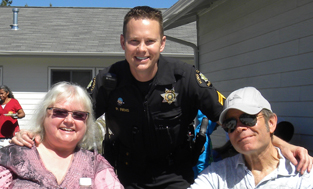Tribal Policing Partnerships: The Muckleshoot Tribe and the Sheriff

Today’s members of the Muckleshoot Indian Tribe in King County, Washington, are the descendants of ancient Duwamish and Upper Puyallup people who used to populate the Central Puget Sound area. Following the establishment of the 6 square mile Muckleshoot Reservation near Seattle by Executive Order in 1857 and 1874, people from this area moved to the Reservation and came to be known as Muckleshoot, rather than by their original tribal names. Their modern-day lands now cross three jurisdictions comprising unincorporated King County, the City of Auburn, and the federally recognized reservation itself. Unlike most Washington State tribes, this community has its own police department—the Muckleshoot Tribe Police Department (MTPD)—made up entirely of King County Sheriff’s Office (KCSO) deputies who wear the uniform of the tribal police department.
This unique contract partnership began in 1999 when the Muckleshoot Tribal Council decided to form an independent, non-tribal law enforcement organization for its community. Using federal grant funds, the MTPD opened their doors with one full-time King County sheriff’s deputy. Today, it boasts 10 full-time deputies plus its police chief, Dan Morrow, a veteran KCSO sergeant.
“Our role has evolved over the years,” said Morrow. “We have tailored our approach to this community, focusing clearly on cultural sensitivity and understanding, good communications, and providing a quality of law enforcement service that meets the unique needs of the Muckleshoot people,” he added.
Morrow is most proud of the department’s evolution, which today includes a HUD-funded tribal housing deputy and two dedicated Community Response Team deputies. These deputies address specific tribal needs and challenges, including conducting follow up investigations and patrolling the reservation in an undercover and/or uniformed capacity. Armed with the right combination of skills, tools, and highly trained personnel, Morrow draws his energy from a team dedicated to learning and constantly building personal relationships in the community. This commitment creates an environment in which MTPD officers can engage in proactive, problem-solving policing work such as dispute resolution and mentoring at the highest level of peace-keeping professionalism.
 “Trust is everything. Our police officers make the effort to build one-on-one relationships. It takes time, but our parents, elders, and the kids get to know officers personally,” offered Kerri Marquez, Tribal Council Member and Chair of the Law and Order Committee. Marquez also emphasized that this familiarity allows officers and tribal members to know who belongs on the reservation and who doesn’t. Relationship building is a powerful collaborative effort and a factor that has helped significantly reduce the gang and drug activity plaguing the Muckleshoot tribe in the past few years.
“Trust is everything. Our police officers make the effort to build one-on-one relationships. It takes time, but our parents, elders, and the kids get to know officers personally,” offered Kerri Marquez, Tribal Council Member and Chair of the Law and Order Committee. Marquez also emphasized that this familiarity allows officers and tribal members to know who belongs on the reservation and who doesn’t. Relationship building is a powerful collaborative effort and a factor that has helped significantly reduce the gang and drug activity plaguing the Muckleshoot tribe in the past few years.
 Marquez believes that “doing and belonging” are critical to individual officer success, and adds that these performance and behavioral attributes are expected of every KCSO deputy who serves the tribe. “It’s a two-way street. The cops have to invest themselves in the tribe and the culture—and our members must make the effort to understand and support the role of law enforcement in keeping the peace in our community,” she explained. She also says that the partnership is working as envisioned. According to Marquez, MTPD officers have built relationships that encourage communication and, as a result, crime and community problems have seen a steady and noticeable decline.
Marquez believes that “doing and belonging” are critical to individual officer success, and adds that these performance and behavioral attributes are expected of every KCSO deputy who serves the tribe. “It’s a two-way street. The cops have to invest themselves in the tribe and the culture—and our members must make the effort to understand and support the role of law enforcement in keeping the peace in our community,” she explained. She also says that the partnership is working as envisioned. According to Marquez, MTPD officers have built relationships that encourage communication and, as a result, crime and community problems have seen a steady and noticeable decline.
One unique feature of the partnership as a business arrangement is the ability of the King County Sheriff’s Office to provide enhanced police services while taking advantage of a federal law, Public Law 83-280.
“The Sheriff has responsibility for the unincorporated lands, so under PL 280, we have an obligation to enforce the law (related to the unincorporated area within the reservation boundary) and the tribe has the choice to have us police its jurisdiction as their independent police department,” noted Jason King, a KCSO contracting and budget modeling expert. “Because the tribe chooses to have the formal relationship and contract partnership, we can deliver the highest level of service in the most cost-effective manner,” King added. He emphasized that this is also an exclusive feature and benefit of tribal policing contract partnerships in some other states. King cited the economies of scale and other operational efficiencies associated with contracting as a financial benefit to the Muckleshoot tribe. For instance, the Sheriff is able to provide regional specialty services such as major crimes investigations, bomb, SWAT, and air support, and additional functions such as 911 call center service—services that the Tribe alone couldn’t afford to support.
The special partnership entails a continuous learning curve for all involved, especially since nearly 2 square miles of the reservation are within the City of Auburn. “We have evolved all of the relationships over time, realizing that a regional view and inter-agency collaboration are the best approach to keeping the peace,” said Morrow of the multi-jurisdictional challenges. While Public Law 83-280 also applies to the City of Auburn for the portion of the reservation within city limits, the tribe has agreements with Auburn police and fire to cover costs for any additional emergency response calls to the Muckleshoot Casino, located within the city’s boundaries.
Morrow and Marquez note that both sides are constantly exploring the possibilities and pushing the boundaries of the policing partnership/relationship and tribal policing. For example, the partners are currently investigating an expansion of the tribal court. Turning to the Washington State Attorney General, King County prosecutor, county courts, and the City of Auburn for advice on how best to accomplish this, Marquez says that the over-arching goals of bringing more court functions onto the reservation are education and prevention. The Tribal Council, she underscores, sees tribal court as a tool and path to help change behaviors and attitudes among members. Moreover, she says an enhanced court system will ensure expedited access to community-based services.
 Another useful tool is the tribal police department’s development of social media and electronic communications. Websites and popular social media pages create a direct link to information for youth and serve as a tip-line mechanism to head off problems for any tribal member. Marquez observes that tribal members have even turned themselves in for outstanding warrants and other infractions because of the constant communication now available and the strong personal relationships with MTPD officers.
Another useful tool is the tribal police department’s development of social media and electronic communications. Websites and popular social media pages create a direct link to information for youth and serve as a tip-line mechanism to head off problems for any tribal member. Marquez observes that tribal members have even turned themselves in for outstanding warrants and other infractions because of the constant communication now available and the strong personal relationships with MTPD officers.
When asked what advice they would give to other tribes and police agencies considering a similar partnership, Marquez and Morrow focused on building trust, establishing relationships, and getting officers involved who are committed to staying with the department for the long haul. “You have to understand the partnership concept and be willing to be committed to the cultural environment you are serving,” said Morrow.
“If it works,” concluded Marquez, “it works for the members and the greater community around us. It works for the cops, too. It can benefit everyone. This is our Muckleshoot Tribal Police Department, and we are proud of that.”
M. Scott Sotebeer, Ph.D.
M. Scott Sotebeer is the civilian chief of staff for the King County Sheriff’s Office, with 15 years of experience in expanding the contracting program and large-scale consolidation efforts. Scott has a Ph.D. in Applied Management and Decision Sciences with a specialization in leadership and organizational change. He has addressed local, state, and national audiences on the subject of contracting and consolidation and is also the founder of USA Strategics, a public and private sector management consulting firm.
Police and People Who Stutter | Partnerships for Preparedness | Events with the Potential to Go Viral | Tribal Policing Partnerships | Solving Missing and Unidentified Persons Cases | Advancing Police Legitimacy | Did you know…?
